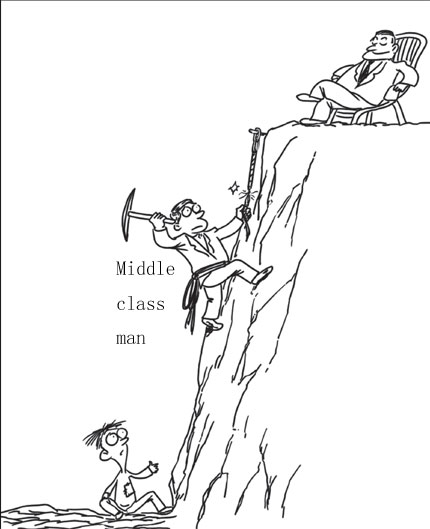Middle classes one bump above poverty
- By Johannes Jütting
 0 Comment(s)
0 Comment(s) Print
Print E-mail Shanghai Daily, February 29, 2012
E-mail Shanghai Daily, February 29, 2012
 |
|
[By Zhou Tao/Shanghai Daily] |
In the 20th century, the American dream of a middle-class life inspired the world.
Now, in the 21st, we are moving at high speed toward a world based on a new geography of growth, with millions of people in the east and the south moving out of extreme poverty to become potentially powerful middle-class consumers.
Whether the dreams of this new global middle-class are realized or turn into a nightmare depends on several factors.
In today's shifting world, with GDP in roughly 80 developing economies rising at twice the rate of per capita growth in the OECD, the club of the world's richest countries, middle-class citizens paradoxically complain and protest regardless of whether fortunes improve or decline. Moises Naim, a former Venezuelan minister of trade and industry, even warns of a possible "emerging global war of the middle-classes."
While anger over pay cuts and unemployment make sense, it is harder to understand the current protests in fast-growing countries like Thailand and Chile, where standards of living are improving. What is going on?
High growth in Asian and southern countries has meant greater export earnings and rents from natural resources. Unfortunately, this blessing can turn into a curse.
Combating inequality
In China, "let some people get rich first" has led to impressive economic growth and poverty reduction; but it has also created inequality.
Indeed, it is telling that, in the spring of 2011, Beijing's municipal authorities banned all outdoor luxury-goods advertisements on the grounds that they might contribute to a "politically unhealthy environment."
Rising inequality, lack of civic participation, political apathy, and a dearth of good jobs, particularly for the young, comprise the Achilles heel of emerging-market countries' current development model.
A Gallup poll on subjective well-being in Tunisia and Thailand shows that, while income levels and social conditions in both countries improved between 2006 and 2010, life satisfaction dropped.
Homi Kharas, a senior fellow at the Brookings Institution in Washington, DC, defines today's global middle class as households with daily expenditures of US$10-100 per person (at purchasing power parity). This represents about two billion people, split almost evenly between developed and emerging economies.
These people will demand more and better services, a fairer division of growth's benefits, and more responsive political institutions.
Better protections
So, what should be done?
First, more extensive social protections must be instituted. Most of the emerging middle class is one income shock from being pushed back into poverty. To counter this risk, social-security programs should be gradually extended beyond social assistance.
India's Employment Guarantee Scheme, Ghana's national health-insurance program, and Lesotho's tax-financed pension plan, which covers more than 90 percent of its population, are all instructive social-protection models for the emerging middle classes.
Second, more (and better) jobs are desperately needed. The global labor force is three billion, of which two-thirds are informally employed.
Indeed, in countries like India, the number of jobs without social protection has increased, despite sustained growth.
Third, a social contract - one that entails better services and greater government accountability - is essential to improving fiscal policy and mobilizing domestic resources.
In countries whose populations are genuinely enfranchised, and where they benefit from good-quality public services, social trust rises, and citizens are more willing to pay taxes.
Opinion polls show that in countries where individuals do not trust one another, more than one-third of the population finds tax evasion acceptable. This number drops to one-tenth in countries where people trust each other most.
Finally, any state that does not give its citizens adequate space to exercise their voice, and thereby strengthen loyalty, is ultimately unsustainable.
The rise of the global middle class will transform the world's social, political, and economic landscape. Fostering cohesive societies - in which people feel protected, citizens trust one another, and efforts are rewarded - is the key to realizing its members' dreams.
Johannes Jütting is Head of Poverty Reduction at the OECD Development Center in Paris. He writes in his personal capacity. Copyright: Project Syndicate, 2012. www.project-syndicate.org. Shanghai Daily condensed the article.






Go to Forum >>0 Comment(s)